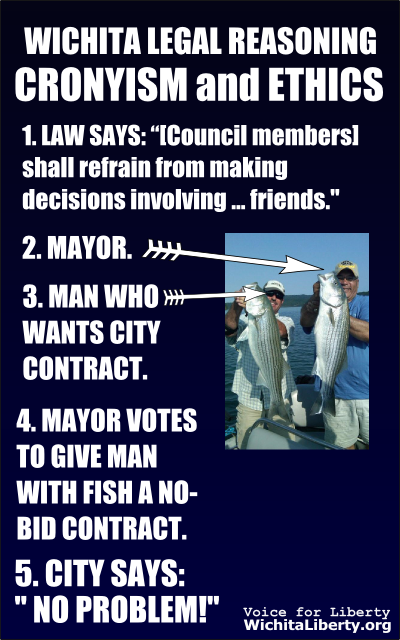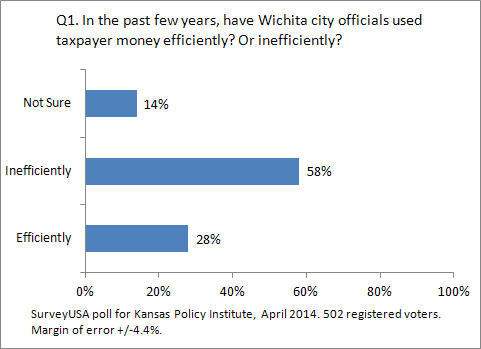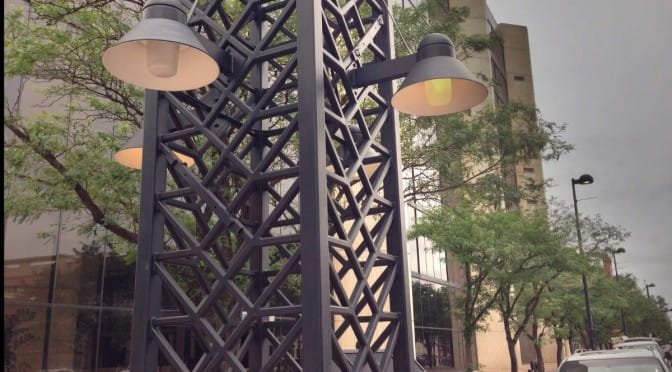Before Wichita city hall asks its subjects for more tax revenue, it needs to regain the trust of Wichitans. Following, from February, an illustration of the problems city hall has created for itself. And, how it would be helpful if the editorial board of the state’s largest newspaper acted as though it cared about ethics, cronyism, government transparency, and corruption.
When buying and selling are controlled by legislation, the first things to be bought and sold are legislators.
— P.J. O’Rourke
Your principle has placed these words above the entrance of the legislative chamber: “whosoever acquires any influence here can obtain his share of legal plunder.” And what has been the result? All classes have flung themselves upon the doors of the chamber crying:
“A share of the plunder for me, for me!”
— Frederic Bastiat
 Tomorrow the Wichita City Council considers a policy designed to squelch the council’s ability to issue no-bid contracts for city projects. This policy is necessary to counter the past bad behavior of Wichita Mayor Carl Brewer and several council members, as well as their inability to police themselves regarding matters of ethical behavior by government officials.
Tomorrow the Wichita City Council considers a policy designed to squelch the council’s ability to issue no-bid contracts for city projects. This policy is necessary to counter the past bad behavior of Wichita Mayor Carl Brewer and several council members, as well as their inability to police themselves regarding matters of ethical behavior by government officials.
The proposed policy is problematic. For some projects the developer will have to pay for “a third party expert to verify construction estimates and contracts with respect to reasonable market costs and appropriate allocation of costs between public and private funding.”
 Why are measures like this necessary? The impetus for this policy is the no-bid contract awarded to Key Construction for the construction of the garage near the Ambassador Hotel, originally called Douglas Place, now known as Block One.
Why are measures like this necessary? The impetus for this policy is the no-bid contract awarded to Key Construction for the construction of the garage near the Ambassador Hotel, originally called Douglas Place, now known as Block One.
A letter of intent passed by the council on August 9, 2011 gives the cost of the garage: “Douglas Place LLC will administer the construction of the garage and urban park on behalf of the City and the City will pay the cost of designing and constructing the same at a cost not-to-exceed $6,800,000.” Of that, $770,000 was for the urban park, leaving about $6 million cost for the garage. The motion to approve the letter of intent passed with all council members except Michael O’Donnell voting in favor.
By the time the item appeared for consideration at the September 13, 2011 city council meeting, city documents gave the cost of the constructing the garage structure at an even $6 million. The motion to spend that amount on the garage passed with all members except O’Donnell voting in favor, except Brewer was absent and did not vote.
 Then the city manager decided that the project should be put to competitive bid. Key Construction won that competition with a bid of about $4.7 million. Same garage, same company, but $1.3 million saved.
Then the city manager decided that the project should be put to competitive bid. Key Construction won that competition with a bid of about $4.7 million. Same garage, same company, but $1.3 million saved.
The Wichita Eagle tells the story like this: “The Ambassador garage at Douglas Place, awarded at $4.73 million to Key Construction — a partner in the hotel project and the project’s contractor — came in about 20 percent under estimates provided the City Council, on the heels of some city-financed downtown parking garages that spiraled over budget.” (“Wichita City Council to consider bidding policy extension”, Wichita Eagle, Sunday, February 2, 2014)
Reading the Eagle story, citizens might conclude that due to excellent management by Key Construction, the garage was built at a 20 percent savings under “estimates.”
But that’s not at all what happened. It’s not even close to what really happened.
Without the intervention of O’Donnell, the city manager, and — according to press reports — city council member Pete Meitzner, the garage would have been built for $6 million. That was the intent of a majority of the council. The $6 million price tag for the no-bid contract was in the ordinance that passed, and in the letter of intent that passed a month before. There were no “estimates” as the Eagle reported. There was only the expressed desire of the council to spend $6 million.
 So there were no “estimates” that Key Construction bested. But there was an objectionable no-bid contract that the council agreed to. Fortunately for Wichita, a few people objected and overrode the council’s bad decision.
So there were no “estimates” that Key Construction bested. But there was an objectionable no-bid contract that the council agreed to. Fortunately for Wichita, a few people objected and overrode the council’s bad decision.
We’re left to wonder why the Eagle retold the story with Key Construction in the role of hero. That’s about 180 degrees away from the role this company plays.
Key Construction is intimately involved in city politics. Its principals and executives contribute heavily to mayoral and city council election campaigns. Company president David Wells is a personal friend of the mayor.
Did Key’s political involvement and campaign contributions play a role in the council awarding the company a no-bid garage contract? Key Construction executives and their spouses are among a small group who routinely make maximum campaign contributions to candidates. These candidates are both liberal and conservative, which rebuts the presumption that these contributions are made for ideological reasons, that is, agreeing with the political positions of candidates. Instead, Key Construction and a few companies are political entrepreneurs. They seek to please politicians and bureaucrats, and by doing so, receive no-bid contracts and other taxpayer-funded benefits. This form of cronyism is harmful to Wichita taxpayers, as shown by the Ambassador Hotel garage.
The harm of pay-to-play
When it is apparent that a “pay-to-play” environment exists at Wichita City Hall, it creates a toxic and corrosive political and business environment. Companies are reluctant to expand into areas where they don’t have confidence in the integrity of local government. Will I find my company bidding against a company that made bigger campaign contributions than I did? If I don’t make the right campaign contributions, will I get my zoning approved? Will my building permits be slow-walked through the approval process? Will my projects face unwarranted and harsh inspections? Will my bids be subjected to microscopic scrutiny?
Wait a minute: Doesn’t Wichita have a newspaper that keeps a watchful eye on cronyism and corruption? With an editorial board that crusades against these ills?
The answer is no. No such newspaper exists in Wichita.
We need laws to prohibit Wichita city council members from voting on or advocating for decisions that enrich their significant campaign contributors. The Ambassador Hotel garage contract is just one example. Citizens are working on this initiative on several fronts. Some find the actions of these candidates so distasteful and offensive that they are willing to take to the streets to gather thousands of signatures to force the Wichita City Council to act in a proper manner.
That huge effort shouldn’t be necessary. Why? The politicians who accept these campaign contributions say it doesn’t affect their voting, and those who give the contributions say they don’t give to influence votes.
If politicians and contributors really mean what they say, there should be no opposition to such a “pay-to-play” law. Citizens should ask the Wichita City Council to pass a campaign finance reform ordinance that prohibits voting to enrich significant campaign contributors.
There is a law, sort of
Citizens who believe that city council members ought not to vote on matters involving their friends and business associates, we already have such a law. Sort of. Here’s a section from the Wichita city code as passed in 2008 (full section below):
“[Council members] shall refrain from making decisions involving business associates, customers, clients, friends and competitors.”
Mayor Carl Brewer voted for this law, by the way. When asked about a specific application of this city law, the Wichita city attorney supplied this interpretation:
Related to the Mayor’s participation in the item, yes, City Code advises Council members to “refrain from making decisions involving business associates, customers, clients, friends and competitors. … ” but the Code does not provide definitions or limits to these broad categories of constituents. Further, the City Code clearly requires Council members to “vote on all matters coming before the City Council except in those particular cases of conflict of interest. …” The city Code does not define what constitutes a conflict but the Council has historically applied the State law for that definition.
Applying that State law specific to local municipalities, the Mayor does not have any substantial interest in Douglas Place LLC, and therefore no conflict. Under the State ethics law, there was no requirement that the Mayor recuse himself from voting on the Ambassador Project.
So we have statutory language that reads “shall refrain,” but the city attorney interprets that to mean “advises.”
We also have statutory language that reads “business associates, customers, clients, friends and competitors.” But the city attorney feels that these terms are not defined, and therefore the mayor and city council members need not be concerned about compliance with this law. We’re left to wonder whether this law has any meaning at all.
 Be advised: If you ask the mayor to adhere to this law, he may threaten to sue you.
Be advised: If you ask the mayor to adhere to this law, he may threaten to sue you.
If the city attorney’s interpretation of this law is controlling, I suggest we strike this section from the city code. Someone who reads this — perhaps a business owner considering Wichita for expansion — might conclude that our city has a code of ethics that is observed by the mayor and council members and enforced by its attorneys.
Giving that impression, through, would be false — and unethical.
Here’s the Wichita city code:
Sec. 2.04.050. — Code of ethics for council members.
Council members occupy positions of public trust. All business transactions of such elected officials dealing in any manner with public funds, either directly or indirectly, must be subject to the scrutiny of public opinion both as to the legality and to the propriety of such transactions. In addition to the matters of pecuniary interest, council members shall refrain from making use of special knowledge or information before it is made available to the general public;
shall refrain from making decisions involving business associates, customers, clients, friends and competitors; shall refrain from repeated and continued violation of city council rules; shall refrain from appointing immediate family members, business associates, clients or employees to municipal boards and commissions; shall refrain from influencing the employment of municipal employees; shall refrain from requesting the fixing of traffic tickets and all other municipal code citations; shall refrain from seeking the employment of immediate family members in any municipal operation; shall refrain from using their influence as members of the governing body in attempts to secure contracts, zoning or other favorable municipal action for friends, customers, clients, immediate family members or business associates; and shall comply with all lawful actions, directives and orders of duly constituted municipal officials as such may be issued in the normal and lawful discharge of the duties of these municipal officials.
Council members shall conduct themselves so as to bring credit upon the city as a whole and so as to set an example of good ethical conduct for all citizens of the community. Council members shall bear in mind at all times their responsibility to the entire electorate, and shall refrain from actions benefiting special groups at the expense of the city as a whole and shall do everything in their power to ensure equal and impartial law enforcement throughout the city at large without respect to race, creed, color or the economic or the social position of individual citizens.

 shall refrain from making decisions involving business associates, customers, clients, friends and competitors; shall refrain from repeated and continued violation of city council rules; shall refrain from appointing immediate family members, business associates, clients or employees to municipal boards and commissions; shall refrain from influencing the employment of municipal employees; shall refrain from requesting the fixing of traffic tickets and all other municipal code citations; shall refrain from seeking the employment of immediate family members in any municipal operation; shall refrain from using their influence as members of the governing body in attempts to secure contracts, zoning or other favorable municipal action for friends, customers, clients, immediate family members or business associates; and shall comply with all lawful actions, directives and orders of duly constituted municipal officials as such may be issued in the normal and lawful discharge of the duties of these municipal officials.
shall refrain from making decisions involving business associates, customers, clients, friends and competitors; shall refrain from repeated and continued violation of city council rules; shall refrain from appointing immediate family members, business associates, clients or employees to municipal boards and commissions; shall refrain from influencing the employment of municipal employees; shall refrain from requesting the fixing of traffic tickets and all other municipal code citations; shall refrain from seeking the employment of immediate family members in any municipal operation; shall refrain from using their influence as members of the governing body in attempts to secure contracts, zoning or other favorable municipal action for friends, customers, clients, immediate family members or business associates; and shall comply with all lawful actions, directives and orders of duly constituted municipal officials as such may be issued in the normal and lawful discharge of the duties of these municipal officials.


 City documents estimate that the property tax savings for the first year will be $312,055. This exemption will be granted for five years, with a second five year period possible if performance goals are met.
City documents estimate that the property tax savings for the first year will be $312,055. This exemption will be granted for five years, with a second five year period possible if performance goals are met.









 But that irony is surpassed by the spectacle — chutzpa — of the incoming chair of a city’s chamber of commerce threatening to move his company out of the city unless the company receives incentives.
But that irony is surpassed by the spectacle — chutzpa — of the incoming chair of a city’s chamber of commerce threatening to move his company out of the city unless the company receives incentives. answer questions regarding this project or any of our business activities: This refers to how the members of the city council will make a judgment that this business is worthy of subsidy, and that others are not. The notion that the City of Wichita can decide which companies are worthy of tax exemptions and investment is an illustration of what economist Frederich Hayek called a “conceit.” It’s so dangerous that his book on the topic is titled “The Fatal Conceit.” The failure of government planning throughout the world has demonstrated that it is through markets and their coordination of dispersed knowledge that we best learn where to direct capital investment. It is simply impossible for this city government to effectively decide in which companies Wichitans should invest their tax dollars. Nonetheless the city council made the decision, and it wants a larger role.
answer questions regarding this project or any of our business activities: This refers to how the members of the city council will make a judgment that this business is worthy of subsidy, and that others are not. The notion that the City of Wichita can decide which companies are worthy of tax exemptions and investment is an illustration of what economist Frederich Hayek called a “conceit.” It’s so dangerous that his book on the topic is titled “The Fatal Conceit.” The failure of government planning throughout the world has demonstrated that it is through markets and their coordination of dispersed knowledge that we best learn where to direct capital investment. It is simply impossible for this city government to effectively decide in which companies Wichitans should invest their tax dollars. Nonetheless the city council made the decision, and it wants a larger role.
